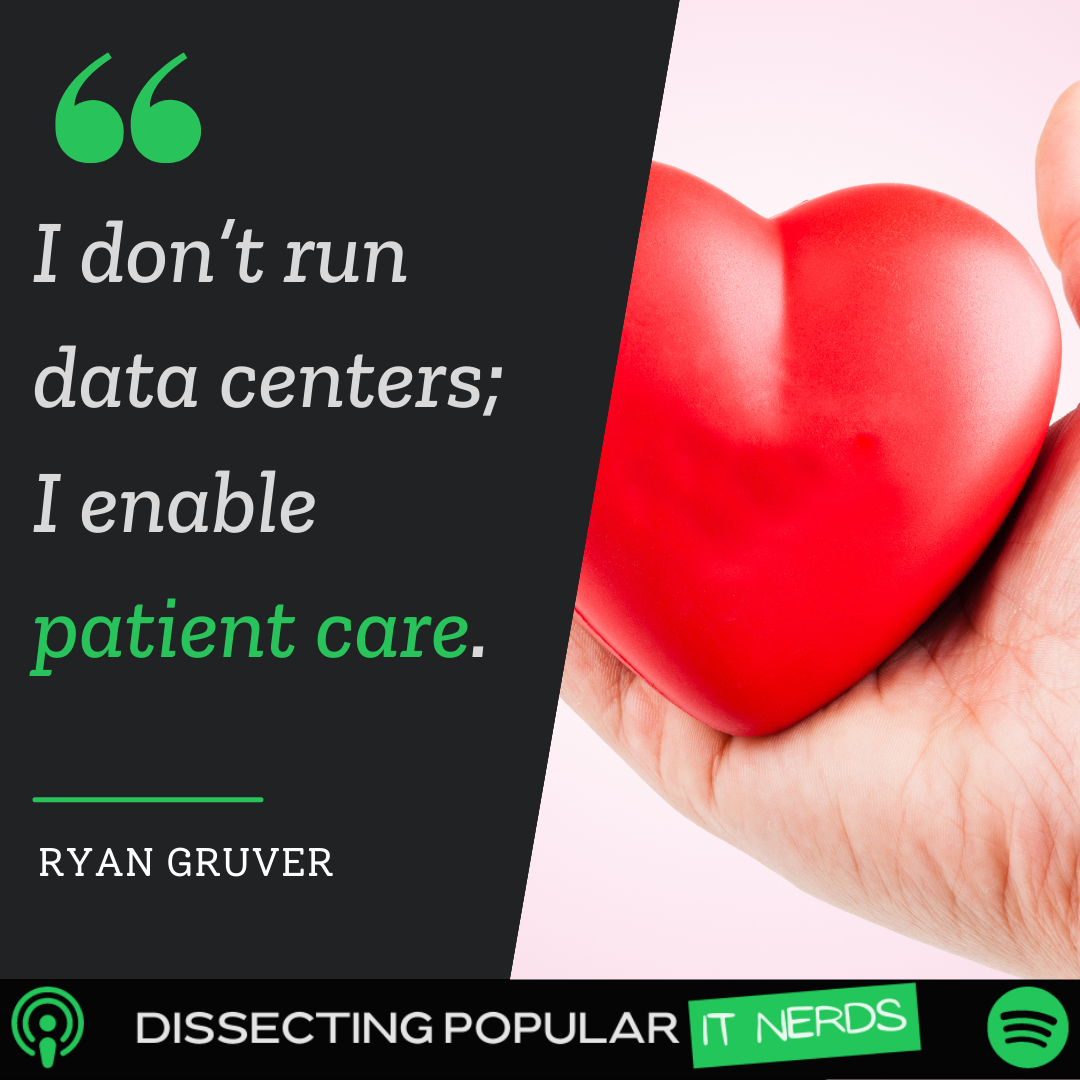
Ryan Gruver
Ryan Gruver is the IT Director at Banner Health. He has been with them for over 14 years, working his way up the ladder from Data Center Operations Specialist to Director of IT. He also holds a bachelor’s degree in Network and Systems Administration from the University of Advancing Technology, and a Master’s of Science in Information Management and Management Information Systems.
What Ryan Gruver Has Learned by Working With the Same Company for 14 Years
Listen to our conversation to hear Ryan’s thoughts on how he ended up in IT, his journey through Banner Health’s IT department, and how to bridge the gap between the IT world and the business world of upper-level management.

I’m not done learning in my own career. I’m always thirsty for that next step.
3 Key Takeaways
- Make sure that you are coachable.
- Build relationships first.
- Be upfront with your leadership. Don't hesitate.
Listen To The Full Episode Below

Episode Show Notes
[0:30] What does your day-to-day look like? How big is Banner Health?
It’s a 60,000-person organization with over 300 locations. I administer the data centers, and have 9 data centers and about a quarter-million square feet of IT real estate. I manage the physical aspects that enable everything else to happen.
[01:10] It’s not quite as large as Facebook’s data centers, but it might be getting up there.
I’ve toured a Facebook data center and the big difference between an enterprise center and them is that I don’t have the redundancy they do. I have to keep everything online.
[01:44] How do you tackle disaster preparedness and redundancy?
It’s about the resilience of infrastructure. I’ve been doing this for 15 years and I have a lot of experience building systems. I’m a certified data center designer and it’s about building fault-tolerant designs. My flagship is an F-4 design, the highest level. My uptime record is 16 years and 11 months.
[03:44] You’ve grown up at one company and seen massive scalable change.
Absolutely! 14 years ago, I left my first IT job where I did everything. I knew construction IT wasn’t for me. I started off at Banner in Data Operations. It was 24/7 365 shifts, monitoring mainframe health and records health, etc. At the time, Banner was looking at building a new primary data center and I expressed interest in it. So, I was hired as a Junior Engineer.
[06:59] You knew that you wanted something different and more challenging in your job and you expressed that. Is it always that simple?
In my opinion, it is. I just onboarded some new people and I told them that you’re going to start off as a Junior, and when you’re ready, I will give you the assignments to get you to the next position. I’m not done learning in my own career. I’m always thirsty for that next step. Be transparent with your leadership.
[11:35] What would your advice be to someone looking to start in IT?
If you go to college, you will probably be aiming more for upper-level engineering or higher leadership roles. If you get into work straight out of high school, it might take you longer if that’s your goal. The reason I went back and got my master’s in 2015 was to help me with that goal, but not everyone needs to take the same route.
[13:10] What level of business-speak do you have? One of the biggest issues is bridging the gap between the technology and business world.
It is a part of joining leadership. I had great mentors that helped me learn the business-speak so I could confidently speak to upper management. It’s an on-the-job process.
[15:25] Do you have any advice for translating into business-speak?
The biggest thing is that I talk about the service I provide and how what I do enables the business to run.
[19:15] In your current role, how big is your team?
Roughly 30. I have the NOC, engineers, the IT infrastructure cabling team, and one guy that runs monitoring tools.
[20:41] What have you learned about coaching a team?
I had to learn to find my own leadership style. I had to work on my emotional intelligence. I think that’s just a thing in our industry. For new leaders, really listen to the people. Building relationships and networking is the most important thing.
[26:00] How do you approach mentors for feedback, etc.?
I just speak my mind. I ask what they need me to work on and I go do it.
[27:40] What’s the biggest frustration in addressing executives?
The biggest pain point is making sure that I can get the capital dollars that I need to do my job and deciding what we need to prioritize.
[29:34] How are those decisions made at Banner and what would make your job easier when advocating for capital?
It’s about knowing the true value of what you want and what you are going up against within the company. Also, networking in the company and risk management.
[34:04] How do you filter real knowledge from vendors?
How they respond to my RFIs and RFPs, and my knowledge helps me to gauge, but that also comes down to experience.
[37:28] What’s your work/life balance?
I have to work on it, but I am better now than when I started.

